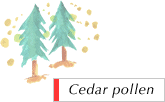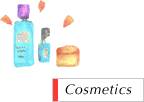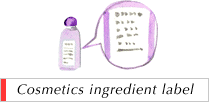Why do allergies occur?
- What is an allergy?
- Why do cosmetics irritate the skin?
- What should I do if cosmetics irritate my skin?
- To avoid causing a skin irritation, what should I be careful about?
- For persons with metal allergies

What will an allergy be?
When you suffer from hay fever in the spring, or when you break out in hives after eating a specific thing...
Those are types of allergies. An allergy is caused by a function known as an "antigen-antibody reaction," in which the body tries to expel a foreign substance (an antigen or allergen). The immune response, something that is inherently essential for the body, goes into overdrive and acts in a detrimental way.
Allergies can be classified into types 1 through 4. In type 1 (immediate), symptoms appear in around 10 minutes, such as with hay fever, hives, bronchial asthma, and allergic rhinitis.
Meanwhile, in type 4 (delayed), a response appears after some time has passed, such as with allergic contact dermatitis (irritation).

Why do cosmetics irritate the skin?
There are two main causes for cosmetic irritations, a typical form of contact dermatitis. These are "irritants" and "allergies."
【Irritant contact dermatitis】
This dermatitis is caused by irritation (toxicity) from something that touches the skin. For example, alcohol, a strong acid, a strong alkaline, or friction will cause irritation in nearly everyone when it reaches a certain point.


The irritation caused by such an irritant will vary depending on the skin's condition at the time.
For example, symptoms are considered more likely to appear when skin is unstable due to things like poor health or the season, when the skin's barrier function is diminished, or when the skin is cut or injured due to shaving or waxing, etc.
【Allergic contact dermatitis】
Dermatitis occurs when antibodies in the body try to expel a foreign substance (allergen).
Only in people for whom that foreign substance triggers a rejection response, symptoms will appear even if the concentration or the amount is extremely small.


An irritation caused by an allergen will occur regardless of the skin's condition at that time.
Even after the symptoms subside, once the person is exposed to the allergen again, they will repeat the same response.
The symptoms are similar in both cases, including redness, itching, flushness, and swelling.
But it's hard to determine whether the cause is an irritant or an allergy, so we recommend consulting with a dermatologist.
What should I do if cosmetics irritate my skin?
Stop using the cosmetics and get the appropriate treatment from a dermatologist.
You can provide first-aid care such as removing the cosmetics you placed on the skin with mild soap, etc., or if there is flushness remove heat from the skin using a towel cooled with water, but amateur remedies often exacerbate the condition. It's best to visit a dermatologist and get appropriate care.


When the medical staff takes your history, it is important to explain what symptoms appeared, when, and under what circumstances, providing as much detail as possible. Even if the symptoms subside, if you don't know the cause they may reappear.
You can investigate the cause by checking one by one what you had used when things got worse and what you had used when things were fine.
Also, some dermatology clinics use a method called "" patch tests
"" to investigate what substance caused the irritation.
To avoid causing a skin irritation, what should I be careful about?
Most importantly, avoid contact with allergens. When an allergen is identified, you can avert cosmetic irritation by avoiding that ingredient. Nowadays, all the ingredients are labeled on the containers or outside packaging of cosmetics, so you can check whether it contains anything that is an allergen for you.
The ingredient names are listed in several different ways, though, so for details please check with the manufacturer. (After April 2008, quasi-drug items also began listing all ingredients under a voluntary standard of the Japan Cosmetic Industry Association (JCIA).)


【A simple test method you can do by yourself】
Even if you avoid allergens, sometimes when you actually use a cosmetic item, it may not agree with your skin. Here is a test method you can easily use in such a case.
【What things are likely to cause cosmetic irritations?】
Perfumes, dye, and base ingredients are often reported.
These substances are included not only in cosmetics, but also in foods, drugs, and clothing, for example, so please watch out for them in your daily life as well.
Perfumes, dye, lanolin alcohol (an emulsifier), the dye in hair dye (PPDA), metal
Metal allergies and cosmetics
Do you sometimes turn red or feel itchy when you sweat?
Sometimes the sweat itself is the culprit, but it may also be a result of metal that the sweat causes to melt and run.
Metal is not problematic in its usual state, but when it runs due to sweat and such, it is likely to cause trouble for those who are allergic to metal.
【Causes of metal allergies】
The first metal that comes to mind that we wear on our bodies is that in accessories.
Because metal allergies are often caused by things like cobalt, nickel, and chrome that are contained in metals as impurities, it can be said that the lower the purity, such as with plated items, the more likely a metal item is to cause an allergic reaction.
Other things besides accessories are leather goods such as watch bands or bag handles. That is because when leather is tanned to give it a lustrous shine, a metal called chrome is used.
The filling used in dental treatments may also trigger a metal allergy.
【Metal in cosmetics】
Though one would assume cosmetics and metal to be unrelated, actually there are tiny amounts of metals such as cobalt, nickel, and chrome contained as impurities inside the iron oxide that is used as a dye in makeup items and sunscreen, etc.
So if symptoms such as redness, itching, and irritation appear after applying makeup items or sunscreen, a metal allergy is one possibility to consider.
And if you already know that you have a metal allergy, use caution when choosing cosmetics.

 English
English
 ภาษาไทย
ภาษาไทย

.jpg)